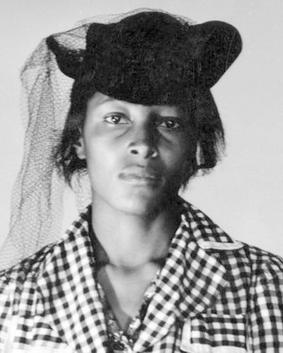Recy Taylor facts for kids
Quick facts for kids
Recy Taylor
|
|
|---|---|

Mrs. Recy Taylor in 1944
|
|
| Born |
Recy Corbitt
December 31, 1919 Abbeville, Alabama, U.S.
|
| Died | December 28, 2017 (aged 97) Abbeville, Alabama, U.S.
|
| Occupation | Sharecropper |
Recy Taylor (born Recy Corbitt; December 31, 1919 – December 28, 2017) was an African-American woman from Abbeville, Alabama. She grew up in a sharecropping family in the Southern United States during the Jim Crow era. This was a time when laws kept Black and white people separate and unequal.
In 1944, Recy Taylor faced a terrible injustice. She was attacked by a group of white men. Even though the men admitted what they did to the police, two grand juries (groups of citizens who decide if there's enough evidence for a trial) chose not to charge them. No one was ever punished for what happened to her.
Years later, in 2011, the Alabama Legislature officially said sorry. They apologized for the state's failure to bring her attackers to justice. Recy Taylor's bravery in speaking out, and the efforts to help her, became an important part of the early civil rights movement. Her case helped inspire people to fight for equal rights across the country.
At the 2018 Golden Globe Awards, Oprah Winfrey spoke about Recy Taylor's story. She helped bring more attention to this important part of history. Also, members of the Congressional Black Caucus wore special "Recy" pins at the 2018 State of the Union address. Recy Taylor's granddaughter, Mary Joyce Owens, was a special guest at this event.
Contents
Recy Taylor's Early Life
Recy Corbitt was born on December 31, 1919, in rural Alabama. Her family worked as sharecroppers, meaning they farmed land owned by others and paid rent with a share of their crops. When she was 17, her mother passed away. Recy then took on the responsibility of caring for her six younger brothers and sisters.
She continued to work in sharecropping. By 1944, when she was 24, she had married Willie Guy Taylor. They had a young daughter named Joyce Lee.
The Fight for Justice Begins
After the attack, a brave civil rights activist named Rosa Parks got involved. She took Recy Taylor's case to Montgomery, Alabama. There, Parks began to gather support for Taylor. She worked with important community leaders like E.D. Nixon, Rufas A. Lewis, and E.G. Jackson.
Parks and her supporters created a group called the Alabama Committee for Equal Justice for Taylor. This group received help from labor unions, African-American organizations, and women's groups across the country. By 1945, they had started a very strong campaign for equal justice. A newspaper called Chicago Defender said it was the "strongest campaign for equal justice to be seen in a decade."
The First Grand Jury Hearing
The first grand jury hearing for Recy Taylor's case happened on October 3–4, 1944. The jury was made up of only white men. None of the attackers had been arrested, so the only people who could speak were Taylor's Black friends and family.
Recy Taylor's family could not identify the attackers by name. The local sheriff never held a police line-up, so Taylor could not point out her attackers in court. After only five minutes of discussion, the jury decided to dismiss the case. This meant no charges would be brought against the men. The only way the case could be looked at again was if a second grand jury decided to indict the men.
Recy Taylor's Legacy and Passing
Recy Taylor passed away peacefully in her sleep on December 28, 2017. She was 97 years old and living in a nursing home in Abbeville, Alabama. Her death came just three days before her 98th birthday. She was buried next to her daughter's grave at New Mount Zion Freewill Baptist Church.
Recy Taylor's story is a powerful reminder of the injustices faced by African Americans during the Jim Crow era. Her courage in speaking out, even when it was dangerous, helped to spark the Civil Rights Movement. Her fight for justice continues to inspire people today.
Images for kids


